Kurt Browning: "Just give yourself to the moment and allow the moment to billow you up and not bury you."
February 9, 2018
By Tina Tyan
Photos © Scott Grant, Joy, Keiko Kasai, Tina Tyan
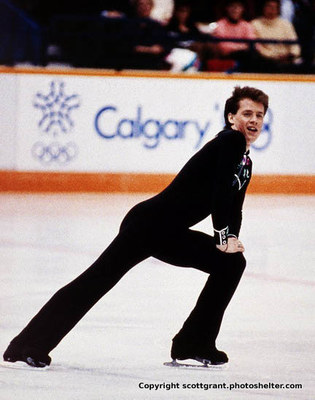
Kurt Browning is a veteran of three Olympic games, a four-time World Champion who is widely considered one of the best skaters never to win an Olympic medal. It's been thirty years since his first Olympic games in Calgary, Alberta, practically in the Alberta native's backyard, and some of his favorite Olympic memories stem from that event. "[I remember] walking into the Olympic opening ceremonies and getting to see my family. The guy I was walking with - 65,000 people in Calgary, and he goes 'I think I hear them yelling your name.' I look up, and two people are standing like this. I go 'that's my brother! hey!' They started pointing, so I look down, and down is my sister, and then she pointed, I look farther, and I found my mom and dad. So out of 65,000 people...that was a very cool moment."
It was at the World Championships later that season that Kurt landed the first official quadruple jump in competition, and some of the motivation may have come from another of his favorite memories from those Olympics. Canadian Donald Jackson was the first man to land the triple lutz in competition, and was taking part in the closing ceremonies when he spotted the young Kurt.
"[At] the closing ceremonies having Don Jackson stop his sleigh, then come over and tell me to go land the quad, and then get back in the sleigh and keep going. It was like, did that just happen? That was kind of cool," he laughed.
Kurt Browning will once again be at the Olympics in Pyeongchang, Korea this year, but this time in the role as a commentator for Canadian network CBC. I had the chance to catch up with him at Scott Hamilton's show in November to pick his brain about a number of topics related to the upcoming Olympics.
Inevitably, the most obvious question to ask was his Olympic predictions, especially given his work as a commentator this season.
"I'm predicting that in dance, right now, I got a feeling that it's going to go French [Gabriella Papadakis & Guillaume Cizeron], because they're so consistent. But honestly, the dance is going to come down to who can create that Olympic moment. The order of skate is going to be important, the panel is going to be important, and then who really made us feel like that was an Olympic moment. Which team. They're going to take it."
He went on, "In men, I always lean towards [Yuzuru] Hanyu because I think he's a bit of a genius. But Nathan Chen has beautiful Lori Nichol programs and Shoma Uno is an amazing skater as well. So those three boys seem to be my top picks right now. Javier [Fernandez] is a lovable, lovable guy who can't be taken out of the equation at all. And Patrick [Chan]? Patrick should just go and skate with nothing to lose and see what happens."
"In ladies? [Evgenia] Medvedeva. [She] just seems to have the system figured out. And then I cross my fingers for Kaetlyn Osmond because I think her jumps are beautiful and her programs are beautiful. I think she skates like a woman and lands her jumps so clean. But this new Alina Zagitova is gorgeous on the ice. And she's really good at everything. It's kind of weird that she backloads her programs with all the jumps. But the system allows it, so what's she doing? She's just being smart and they're not penalizing her for how the layout of the program is, it seems. So those are my three. I think those three are going to do it."
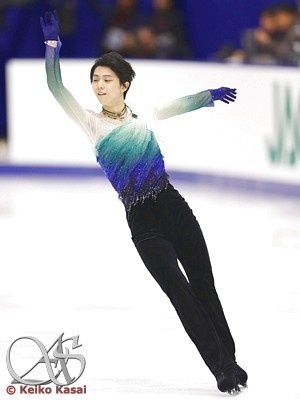
"Pairs? Chinese [Wenjing Sui & Cong Han]. Chinese. Chinese, and then Russians [Evgenia Tarasova & Vladimir Morozov] probably. And after that, I don't know," he concluded.
Of course, there are predictions for the Olympic podium, and then there are personal favorites. Kurt's favorites may not always top his predicted podium, but they bring out the fan in him.
"[In pairs], Chinese," he said immediately. "I just get a kick out of Hanyu. When he's on, he's like a skinny little rockstar. I fangirl for him, a little tiny bit. In dance, it's Tessa [Virtue] and Scott [Moir] because they tell a story, they're good actors and actresses. And in ladies, Kaetlyn, just because of what I said before. And Canadian, and a friend."
It seemed only natural to ask a veteran Olympian what advice he'd give to skaters going to the Olympics. Kurt struggled with his answer, though, since the truest advice can't be boiled down to a simple response.
"Act as normal as you can, and don't expect it to be feeling normal at all," he laughed. "But just...keep it as simple as you can. Keep it just 'you jump up, you turn, and you land.' Keep it dumb. Keep it simple. Don't glorify how difficult this is, this moment. Literally keep it somewhat mechanical."
"The one who seems to win is the one that's loose and free in the moment. The one that skates like they've got nothing to lose? They're the ones that win. So that goes against everything I just said," he mused. "Just give yourself to the moment and allow the moment to billow you up and not bury you. So don't pretend it's going to be like another day, but you know, when it comes to that little moment, it's just a double axel. Do it, land, and then let the moment continue."
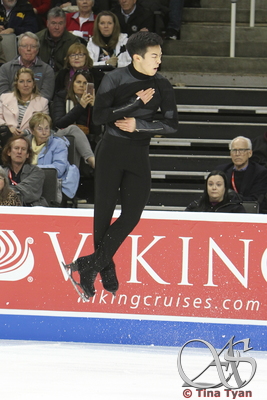
Quadruple jumps have become ubiquitous in men's figure skating, with the United States' Nathan Chen being the first to land five quads in one program, and others following close behind. This increased emphasis on quadruple jumps has met with mixed reactions from the skating world, with some viewing it as the natural technical progression of the sport, while others decry it as putting too much weight on jumps, even at the expense of clean programs.
"Elvis Stojko often talked about the fact that if the best in the sport are doing something that's hard, difficult and dangerous, then it should just be taken granted that the sport has to grow. So yes, I think it's awesome. Our sport isn't just quads though, so it's a good question. I heard a rumor that next year or soon, they're going to start actually limiting how many quads you can try. Which I think is kind of an interesting thing because they are so difficult and so hard to train multiple quads that we must be getting kind of close to the edge of what people can do with this sport," he marveled. "Truly these people are pioneers and incredible. The men's event has exploded."
"So I kind of like that idea. And then you are forced to really choose." He continued, "Wouldn't that be an interesting tactic to have to choose which [quads] you would pick to try? So I love it, I love that the guys are doing that. I think it's great. It's forward thinking within the sport. And I'm also curious about this new rule that I've heard about that may or may not happen."
It has been remarked that some countries seem to have their own standards and rules for qualifying that are higher than others'. Kurt doesn't view this as particularly unfair. He stated, "I think that every parent has different expectations for their children so, yeah, that's fine with me."
Another somewhat controversial development in the sport has been the team event. Kurt has strong opinions on this subject.
"First off, for the team event, I think that it's handled wrong, and I think that it should be after the main event, truly. I think we should have the Olympics, and then we have the team event. Because let's let you get ready, give all your attention towards the individual effort, and then you do the short program one more time for your team. It just seems like it's backwards to me. The athletes are not totally into it. They can't be, when they know they have to compete at the Olympics next week. It's very disjointed for me."
He also has ideas for making the team event more of an actual team event.
"I think if it's a team event, then there should be a team group number. If you've got eight skaters in a team, then you've got four minutes, what can you eight skaters do? Figure out some rules. And then we have a group number. So we have the short program, and then we have the long which is all 8 of you, coming and going and doing things like a Stars on Ice group number. And mark it. And that would be fun, and it would be a team event instead of you rehashing the same long program you've already done," he said. "So am I in love with the team event? Absolutely not. I would love it if it was moved and I would love it if it had an actual team element. It would be more fun."
He is ok with skaters being known as Olympic medalists when they didn't earn an individual Olympic medal, with a caveat.
"I love that skaters are known as Olympic silver medalists, as long as they mention that it's the team. I think there's a weird little bitter aftertaste in my mouth when they're announced as 'Olympic silver medalist' And I go yeah, but they didn't do it on their own. You know?"
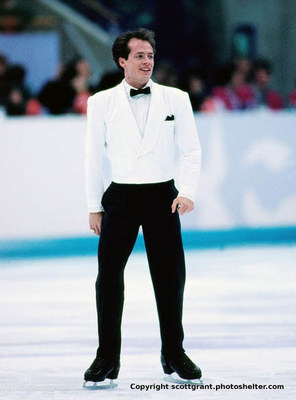
The Olympics are often viewed as the premier sporting event, the pinnacle of athletic achievement towards which athletes train their entire lives. Some feel that there is too much weight on this one competition, and that the pressure often seems to lead to subpar skating performances.
Kurt seemed surprised by the question. "Often? Oh...maybe. But, how exciting. Why not have a big party every four years? Yeah I'm okay with it. It's fun. It's exciting."
The flip side of Olympic achievement is that athletes who don't win the Olympic gold are often perceived as falling short. Kurt Browning is often brought up as a counter example of a skater who never won an Olympic medal of any color, but won four World golds (and one World silver) and is still perceived as one of the "greats" in the skating world. Some still feel an Olympic gold outweighs the multiple world championships. But, from the horse's mouth, which would Kurt have preferred?
"Well, I got to win at home, which was huge. Winning in Canada was a really really wonderful thing to happen to anyone. So compare that to an Olympic medal? I guess the Olympic medal would have been better?"
Pressed if he would have traded, he equivocated.
"I don't know! I just don't know. I'm going in different directions with my mind. As the Olympic champion, you're kind of always the Olympic champion, forever. But as the World Champion, you kind of have to go win it again. So by getting out there and fighting for it again and earning it for another 365 days? That was such a cool feeling. And then putting it out there, putting up your hands going 'anyone come and take it' and then taking it back again.... A multiple Olympic champion, that must be crazy. To defend an Olympic title must be amazing. So I don't know. But I think if I was asked to choose, I would probably go Olympic over multiple World. Probably."
However, he wouldn't trade for just any Olympic medal, if he'd trade at all. "Olympic Gold," he stated, and then backtracked again. "I think. I don't know."
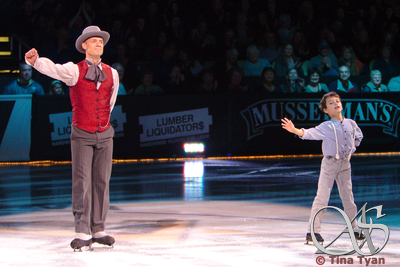
But while Kurt in theory would trade multiple World titles for an Olympic gold, in reality, he wouldn't change a thing about his life. Asked if people still asked him if it bothered him that he doesn't have an Olympic medal, he was quick to respond.
"I'm never asked that question," he insisted. "I think people don't ask me that question because how dare anyone look at my life that is so gifted and lucky and think that I boo hoo anything. Because I don't. I'm one of the luckiest people I've ever met in my life, on or off the ice, and I don't regret. I don't know what I would have become had I won the Olympics. You can't really go back in time and say my life would be like this. Who's to say?"
He continued, "There's a balance in the planet, and I got to do everything I ever wanted to do. So I think people look at my career, I hope they see a happy person."



